Fine Art Studios
This page will assist you with a list of potential class offerings for Fine Art Studio 2 (VART 3695) and Fine Art Studio 4 (VART 3697) under Bachelor of Arts (Fine Art) Hong Kong program in Semester 2.
(Note: There is a separate page for Workshop classes.)
You will only take one Fine Art Studio class in semester 2, but you need to list three (3) preferences. These Fine Art Studios will be for both first and second year students and will be offered under the following course codes:
Year 1: Fine Art Studio 2 (VART 3695)
Year 2: Fine Art Studio 4 (VART 3697)
These Fine Art Studio classes are 24 credit point courses and will require 6 contact hours per week plus associated learner directed hours.
The preferencing process will be communicated to you by Hong Kong Art School in due course.
For more information about a course, and/or to seek academic advice from your specialisation coordinator prior to deciding, please contact Hong Kong Art School.
IMPORTANT - PLEASE NOTE: You must not repeat any class in your preference lists. Every effort will be made to place you in your first preference classes. Selected classes would be offering in each year, please refer to class information provided by Hong Kong Art School for details. Although we would like to offer all of the options below, classes are subject to viability and may not run if numbers are too low.
Course Information
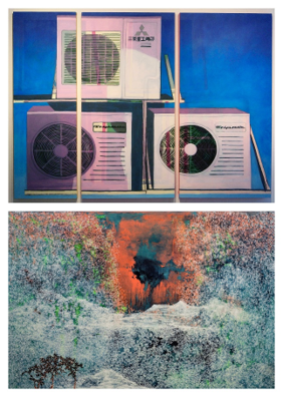
Top: Stephanie Sin, Apliu Outdoor Units 01, 2016
Bottom: Tsang Chui Mei, In the deep silence, 2017
Abstract Practices
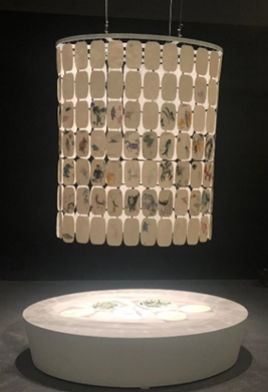
Jakie Leung x Rex Chan‧Denise Chen‧Ryan Cheng, Mixture, 2018
Craft in Contemporary Ceramics and Art of Porcelain
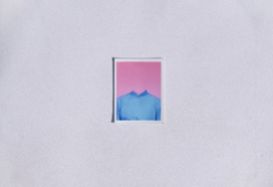
Paul Yeung, I met you somewhere
Human Presence, Representation: Theory & Practice
"In this course offering you will be introduced to local and global ideas and practices examining modes of representation and ways of seeing. Linking theory to practice this course will develop your formal and conceptual understanding of representation and your knowledge and application of these fundamental ideas.
The objectives of this course offering are to understand how knowledge and making are linked through ways of seeing and thinking, to investigate pictorial languages and conceptual approaches to communication through the making of creative works, and, to relate critical concepts, texts and practices to your studio production. The course looks particularly at the idea of human presence in photography specifically to do with; picturing people, voluntary and involuntary portraiture, series and sequencing, (Re)presenting absence and a range of alternative representational strategies in photography."
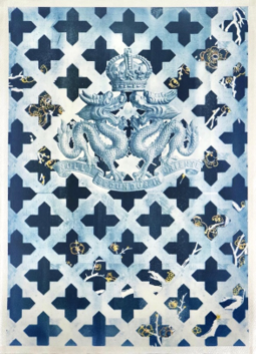
Jerry Ho, Who the Fxxk Cares #1, 2020 (Cyanotype, gold ink on paper)
Making Pictures with Light, The Language of Art
This course explores a range of experimental processes and alternative techniques used in photography relating to exposures, post processing techniques, light sensitive papers, and dark room processes, the course explores processes including; photograms, photomontage, the pin hole camera, and solarization.
As well, the course covers the teaching of photography as a visual language covering issues relating to the role of art and linguistics, visual signs, grammar and syntax, and images and words will be explored. It approaches photography as not just a technical process, but also a complex visual language which engages meaning and aesthetics. It is based on the idea that photography has a structured visual language.
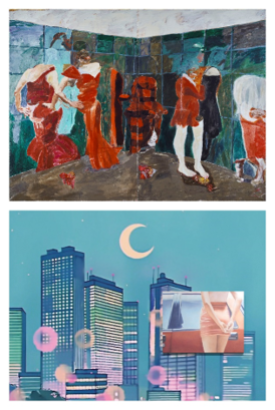
Top: Halley Cheng, Pageant, 2020
Bottom: Sarah Lai, Midnight temptation, 2018
Painting Diversification
"In this course you will develop your own unique studio practice in relationship to the expanded field of painting that may include painting, collage, works on paper, the object and installation. You will experience new strategies for generating ideas and stimulating your imagination, that lead to the development of a flexible studio work proposal that is sustainable and research focused to your own individual ideas. Themes in contemporary art will be investigated to demonstrate how artists initiate, expand and maximise outputs through experimentation and research. Ideas may include: the body, nature, abstraction, materiality, colour, chance, series, memory, the known and the unknown. You will identify your field of practice and participate in an Exhibition Project where you will curate, exhibit, critique and document your work in a collaborative group exhibition. This will provide valuable information and experience in exhibition practice, gallery installation strategies and professional practice that will prepare you for a career in the arts industry.
You will experience individual tutorials, peer-to-peer discussion and group feedback sessions, field trips to local museums, demonstrations and health and safety; experiences that will enrich and sustain your continued development as artists in a supportive and stimulating environment."
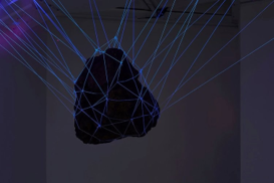
Jaffa Lam, Birth Rock (From installation: Tin Hau is coming for a piece of water), 2018 (Volcano Rock, thread, UV light, 35 x 40 x 50 cm, Artist’s own weight)
Sculpture, Nature and the Body
This subject develops knowledge and facility in the study of the human body and aspects of the natural world. It provides practical, technical, interpretive and theoretical methods for studying and translating the human body, flora and fauna, geological structures and a range of other natural forms and phenomena. It will employ standard modelling and plaster casting processes and techniques, and a range of other 3D transformation techniques.
Over the course of the semester a series of practical studio classes, theoretical discussions and projects will address both contemporary and historical perspectives in sculpture as it relates to the body and nature.
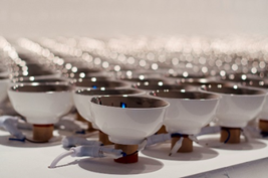
Joe Chan, Ming Jing, 2015
The Ceramic Vessel as a Political or Social Commentary
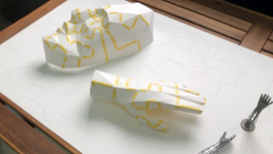
Otto Li, Creative Process of Digital Atlas of Meridian No. 1, 2020
Thinking Through Making in Sculpture
In this course you will develop practical skills across a range of processes and materials which are commonly used in sculpture practice. This course aims to further develop your sculptural practice by focusing on an individual and hands-on approach to making. This will allow you to be productive in an intuitive and creative way and build a deeper understanding of your own interests. You will be introduced to particular methods and materials through specific projects, with an emphasis on the relation to individual concepts in art making.
It focuses on an individual and hands on approach to making, explore your individual intuitive and creative techniques in contemporary sculptural form. You will be given practical instruction and experience in the use of workshop equipment together with relevant health and safety training.